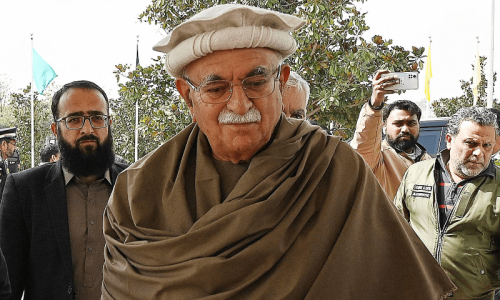Imran Yusuf examines why Test cricket has failed to capture the public imagination in Pakistan.
The recently concluded Ashes series featured two ordinary teams playing a lot of average cricket with very few outstanding feats. Yet it was an outstanding series: an epic contest, a compelling narrative, utterly watchable from start to finish. It had twists and turns, personal failures and redemption, grand emergences and glorious departures. And it had winners. Aside from England, Test cricket scored a big victory, as did the Ashes, which once again proved itself the biggest series in cricket. Not bad for a little old urn.
As a Pakistani fan, one looked on with a tinge of envy at the scenes from the Oval on Sunday. When was the last time our team was involved in such a Test series? Recent decades have included fascinating contests against England, a thrilling tour of the West Indies in 1987-88, the momentous India series of 1987, 1999, 2004 and 2005, and some other intriguing see-saw battles. None of these series can claim the same weight of meaning as the Ashes. Despite the excellence of the cricketers (the West Indies series in 1987-88 featured the two best teams in the world) or the political significance (most prominently the 'Dosti' series against India in 2004), it just doesn't feel the same when we play Tests. This statement can lead to an inferiority complex - but it shouldn't.
Test cricket has never fully captured the public imagination in Pakistan. Even in India, Test cricket is more popular, though still far less followed than in England, Australia and South Africa. Pakistan is a modern creation; our love of cricket bloomed in modern times. During the 1950s and 1960s, cricket gradually crept into the hearts of Pakistanis - but ever so slowly. This was not love at first sight.
In Pakistan's early years, the game was still largely the preserve of the elite. Our captains were refined Oxbridge gentlemen, not warriors from the NWFP (interestingly, our most successful captain managed to straddle both these identities). With the commercialisation of cricket in the 1970s and the explosion of the televised game, culminating with the World Cup moving out of England (and to the subcontinent) for the first time in 1987, cricket spread to the masses. Cricket came to the ghetto. It came to the gully. And it has never left.
This was precipitated, of course, by the emergence of ODI cricket. Pakistan's stadiums are as deafening as a rave party during the quick versions of the game, but silent as a funeral for Test matches. We reserve the praise of 'great shot!' for big sixes, not forward defensives. Pakistan's equivalent of the Ashes - a long, winding story often veering from hope to pain to horror to triumph - is the ODI (and now T20) tournament. We start slow and then come into our own. Our true natures emerge as the narrative unwinds. The team has heroes and villains and often both (sometimes both good and evil reside in the same man). All this unfolds over the course of the tournament. We may not have Test series to rival the Ashes but, for the most part, whenever we play a one-day tournament you can be sure Pakistan will be in for an epic ride.
The Ashes dates back to 1882. Pakistan cricket's true baptism of fire didn't occur till 110 years later. Sure, we had the Oval win in 1954, and an away series victory in India in 1987, but none of these filled us with the joy and confidence of winning the ODI World Cup in 1992. We are forever a primarily one-day cricket nation, and to hanker for a Test series one day which will grip the nation like the Ashes does in England and Australia is to dream that we go against our nature.
We are what we are: which is why I look forward to the ODI Champions Trophy next month - but dread our away Test tour to Australia in December.












































